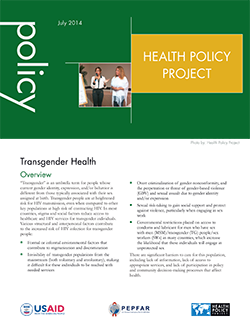The Health Policy Project ended in 2016. Work continued under Health Policy Plus (HP+) until 2022.
Transgender Health

Health Policy Project/Dominican Republic
Overview
Addressing Barriers to HIV-Related Services for Transgender Individuals
"Transgender" is an umbrella term for people whose current gender identity, expression, and/or behavior is different from those typically associated with their sex assigned at birth. Transgender people are at heightened risk for HIV transmission, even when compared to other key populations at high risk of contracting HIV. In most countries, stigma and social factors reduce access to healthcare and HIV services for transgender individuals. The limited health-related data for transgender persons worldwide are consistent: transgender women (individuals whose sex assigned at birth was male but currently identify and/or express as female) are almost 50 times more likely to be HIV positive than other adults of reproductive age. Transgender sex workers are four times more likely to be living with HIV than female sex workers. Transgender men (individuals whose sex assigned at birth was female but currently identify and/or express as male) are at elevated risk for HIV as well, because many of these individuals identify as men who have sex with men, and face health risks similar to those faced by other key populations.
Various structural and interpersonal factors contribute to the increased risk of HIV infection for transgender people:
- Formal or informal environmental factors that contribute to stigmatization and discrimination
- Invisibility of transgender populations from the mainstream (both voluntary and involuntary), making it difficult for these individuals to be reached with needed services
- Overt criminalization of gender nonconformity, and the perpetration or threat of gender-based violence (GBV) and sexual assault due to gender identity and/or expression
- Increased risk of physical and sexual victimization for transgender people in prison contexts
- Sexual risk-taking to gain social support and protect against violence, particularly when engaging in sex work
- Governmental restrictions placed on access to condoms and lubricant for men who have sex with men, transgender people, and sex workers in many countries, which increases the likelihood that these individuals will engage in unprotected sex.
There are significant barriers to care for this population, including lack of information, lack of access to appropriate services, and lack of participation in policy and community decision-making processes that affect health.
What We Do
The USAID- and PEPFAR-funded Health Policy Project (HPP) is committed to enhancing access to high-quality and welcoming healthcare services among transgender individuals who are often at higher risk for HIV infection and morbidity. To do so, we strengthen the capacity of government, health institutions, civil society, community-based organizations, regional networks, and individuals to advocate for stronger policies and equitable health services for people most at risk of HIV infection. We also work to empower transgender individuals and other vulnerable populations to become more involved in the policy process. We
- Strengthen the capacity of transgender (and gender-nonconforming) individuals to participate in the decision-making process and influence policy change for equitable access to health services
- Provide technical assistance to government and health institutions in developing policy and advocacy tools to improve health and HIV services for transgender people
- Foster partnerships among government institutions, national HIV councils, and transgender populations to devise and implement policies and strategies that curb HIV-related stigma and discrimination
- Develop capacity-building tools for healthcare providers, in collaboration with transgender networks, to train providers on appropriate, respectful care of transgender patients, and in the identification and prevention of GBV
News
Dominican Republic Activists Work To Advance Transgender Health Care
Transgender Men in Uganda: What We Want You to Know—and Do
HPP Supports Transgender and Hijra Consultation in Kathmandu
HPP Trains Caribbean Physicians on Transgender Healthcare
Publications and Resources
Gender and Sexual Diversity Resources
Addressing Barriers to HIV-Related Services for Transgender Individuals
Policy Analysis and Advocacy Decision Model for HIV-Related Services: People Who Inject Drugs


